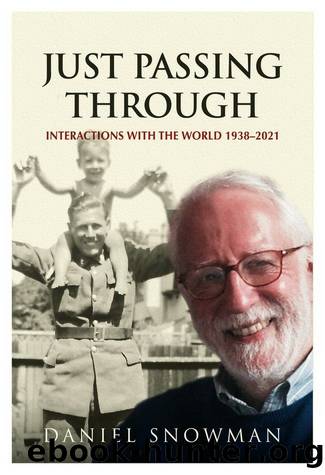Just Passing Through by Daniel Snowman

Author:Daniel Snowman
Language: eng
Format: epub
Publisher: Brown Dog Books
Poster for The Long March of Everyman.
* * *
The Long March of Everyman was conceived in a Britain that had recently found itself plunging deep into a debate about the role of the individual in the national community and, on a wider stage, the role of Britain in the world. Who are the British? Are we, basically, white? And Protestant? Are Kenya Asians (with British passports) British, and should they have the same rights as are normally available to British citizens? What about children or criminals; should they be treated as though they were the same as the rest of us? And homosexuals? How far should individual âdeviantsâ be permitted to behave as they wish? And (on a global scale) what sort of âspecial relationshipâ should we have with the United States? Should we join the Common Market? What obligations did we have to the former colonies?
These and similar questions, familiar as they may have come to feel a generation or two later, were being fiercely and freshly debated in the late 1960s and early 1970s when options still seemed open and answers not foreclosed. In the aftermath of war and empire, many people in Britain found themselves contemplating their national past with a new sense of urgency and mission. The quest for national self-definition was part of the context that helped create The Long March, while the programmes themselves, with their hugely variegated dramatis personae, were perhaps our contribution to the debate.
* * *
There was one other respect in which The Long March of Everyman embodied the era in which it was produced, and that concerned recent changes in broadcasting technologies. The arrival and enthronement of magnetic tape had enabled radio producers to aim at far higher standards of recording and editing than had ever been possible before. Charles Parkerâs Radio Ballads and Michael Masonâs Long March of Everyman would have been impossible before tape. In addition, from the mid-1960s, more and more people were switching to colour television sets. This brought a great deal of revenue to the BBC, much to the delight of programme makers like myself, though it also accelerated the already rapid shift in popular attention from radio to TV. More than that, the shift to television and the ubiquity of magnetic recording tape both contributed to a deeper trend that fed back into all modes of communication: a gradual move from an essentially linear culture of speech and print towards a modular one of bullet points, frequent shifts of voice and camera angle and, in general, shorter, sharper forms of expression that, in a later microelectronic age, would lead to what came to be called âsound bitesâ. Looking back, it is not hard to see how todayâs rapidly moving digital culture was in some ways preceded â heralded â by the Goons, Monty Python and the telly commercial with their rapid edits, dissolves, striking juxtapositions and highly economical foreshortenings of sound, speech and meaning. And perhaps by a landmark series of BBC radio programmes
Download
This site does not store any files on its server. We only index and link to content provided by other sites. Please contact the content providers to delete copyright contents if any and email us, we'll remove relevant links or contents immediately.
I Have Something to Say by John Bowe(3285)
What Happened to You? by Oprah Winfrey(1475)
Doesn't Hurt to Ask by Trey Gowdy(1400)
Einstein: His Life and Universe by Walter Isaacson(1317)
Solutions and Other Problems by Allie Brosh(1030)
Disloyal: A Memoir by Michael Cohen(1022)
American Dreams by Unknown(860)
Don't Call it a Cult by Sarah Berman(841)
Infinite Circle by Bernie Glassman(830)
Home for the Soul by Sara Bird(811)
Group by Christie Tate(810)
Talk of the Ton by unknow(735)
The Silent Cry by Cathy Glass(683)
Total F*cking Godhead by Corbin Reiff(664)
Severed by John Gilmore(654)
Searching for Family and Traditions at the French Table by Carole Bumpus(648)
The Battle of Mogadishu by Matt Eversmann & Dan Schilling(613)
Before & Laughter by Jimmy Carr(604)
Things I Wish I Knew Before My Mom Died by Ty Alexander(599)
